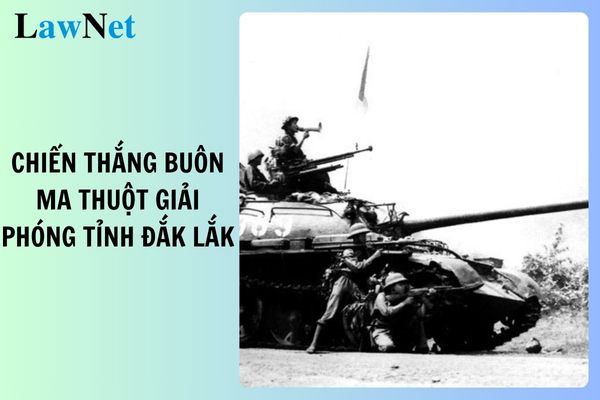What are the answers to the 3rd examination of the "Learn about the 50th Anniversary of the Victory of Buon Ma Thuot and the Liberation of Dak Lak Province" contest?
What are the answers to the 3rd examination of the "Learn about the 50th Anniversary of the Victory of Buon Ma Thuot and the Liberation of Dak Lak Province" contest?
The 3rd examination of the "Learn about the 50th Anniversary of the Victory of Buon Ma Thuot and the Liberation of Dak Lak Province" contest takes place from February 24, 2025, to February 28, 2025.
Below are the reference answers to the 3rd examination of the "Learn about the 50th Anniversary of the Victory of Buon Ma Thuot and the Liberation of Dak Lak Province" contest:
|
Answers to the 3rd examination of the "Learn about the 50th Anniversary of the Victory of Buon Ma Thuot and the Liberation of Dak Lak Province" contest
Question 1: What is the target GRDP per capita in Dak Lak province for the year 2025? |
|---|
Note: The answers to the 3rd examination of the "Learn about the 50th Anniversary of the Victory of Buon Ma Thuot and the Liberation of Dak Lak Province" contest are for reference purposes only.

What are the answers to the 3rd examination of the "Learn about the 50th Anniversary of the Victory of Buon Ma Thuot and the Liberation of Dak Lak Province" contest? (Image from the Internet)
What are the characteristics of the 12th-grade History curriculum in Vietnam?
According to the General Education Program issued with Circular 32/2018/TT-BGDDT, the characteristics of the 12th-grade History curriculum in Vietnam are stipulated as follows:
- History is a subject belonging to the group of Social Sciences, selected based on career orientation at the upper secondary level.
- History aims to help students form and develop historical capabilities, a component of scientific capacity, while also contributing to the formation and development of the key traits and general abilities identified in the overall program.
- History plays a leading role in educating patriotism, national pride, historical traditions, and national culture. It helps students recognize and apply historical lessons to solve real-life problems, develop vision, and consolidate human values, community spirit, tolerance, and compassion; contributing to forming and developing the traits of Vietnamese citizens, and global citizens in the era's developmental trend.
- History forms and develops historical thinking, systematic thinking, critical thinking, skills in exploiting and using historical sources, recognizing, and presenting history logically across different times and spaces, and connecting the past with the present.
- History helps students recognize the scientific and practical value of history in modern social life, fostering an understanding and love for national and human history and culture; guiding students towards career choices such as social and humanities research, diplomacy, management, tourism activities, cultural industries, information, and communication, etc.
- The general education program for History systematizes and consolidates general historical knowledge at the basic education stage while helping students delve deeper into core historical knowledge through subjects and topics about world history, Southeast Asian history, and Vietnamese history. The teaching methods of History are implemented based on fundamental historical principles and modern educational methods.
What are the requirements regarding forming sore traits and general competencies in the 12th-grade History curriculum in Vietnam?
According to the General Education Program for History issued together with Circular 32/2018/TT-BGDDT, the educational methods when teaching 12th-grade History to form core traits and general competencies are as follows:
* General orientation
The History Curriculum is developed with a competency development orientation, therefore, the main teaching method is to energize the learner's activities.
The active teaching method emphasizes organizing activities for students related to life situations; combining intellectual activities with practical applications; enhancing self-study, group work to develop core traits, and general competencies (autonomy and self-study capabilities, communication and collaboration skills, problem-solving, and creativity) and historical competence in students to meet the goals of the General Education Program.
* Orientation for methods of forming and developing sore traits and general competencies
- Methods for forming and developing sore traits
Through organizing learning activities, teachers help students gradually form and develop patriotism, genuine national spirit; pride in the historical traditions of their homeland and country; developing human values, benevolence, honesty, social responsibility, readiness to participate in national construction and defense. Concurrently, through history lessons, teachers inspire students to love history, fostering curiosity and discovery about history.
- Methods for forming and developing sore traits and general competencies
In history teaching, teachers help students develop general competence through learning content and practical activities, such as:
+ Autonomy and self-study competence: developed through activities like gathering information from historical sources, presenting personal opinions about historical events, characters, processes; field and monument visits, applying historical knowledge to explain real-life issues; exploring, researching, and self-learning in history...
+ Communication and collaboration competence: developed through group activities, experiences at historical sites, museums, interviewing historical witnesses...
+ Problem-solving and creative competence: developed through activities of identifying problems, proposing hypotheses, individual opinions about historical events and characters; finding logic in problem-solving, evaluating solutions to historical problems; applying historical lessons to real-life situations…

